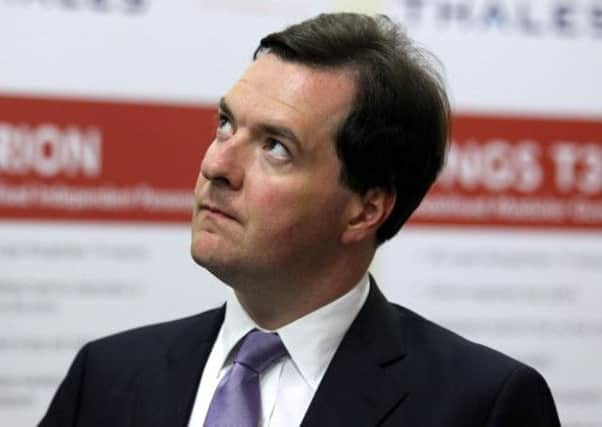Hugo Radice: Dismal economic facts and figures mean Osborne’s days of austerity may be numbered


But before we raise a toast to a 0.3 per cent quarterly increase in national output in the first quarter of 2013, we should put this figure in perspective. Over the three years from 2010 to 2013, output has grown by by a total of only 1.7 per cent – as against the Office for Budget Responsibility’s June 2010 forecast of 8.4 per cent per cent.
The reasons for this dismal economic performance are increasingly obvious. Growth was supposed to come from sharp recoveries in business investment and in exports. Even three years ago, Mr Osborne’s critics suggested that this rosy view was unjustified, and so it has proved. Businesses have been reluctant to invest in the face of persistently stagnant demand, and the ongoing banking and sovereign debt crises in the eurozone have impacted on demand in our largest export markets. Furthermore, UK households have cut back on their consumption in the face of falling real incomes and a desire to reduce the excessive amount of debt they took on during the boom.
Advertisement
Hide AdAdvertisement
Hide AdEconomic stagnation has had two further important consequences. First, it has made it much harder for UK banks to restore their balance sheets and their capacity to lend. The supply of £375bn of cash by the Bank of England through “quantitative easing” has not led to the expected increase in the supply of credit to businesses and households.
Instead, the funds have been hoarded by the banks, because they have been largely unable to clean up the bad loans on their books, let alone to raise new capital to underpin their lending. In these circumstances, it is not at all surprising that the Co-operative Bank has pulled out of its bid to take over the 632 branches that Lloyds TSB has been obliged to sell off.
Secondly, stagnation has reduced tax revenues and increased government spending. The OBR reports that public sector borrowing for 2012-13 has only been held to £120bn because government departments have cut their planned spending by £11 bn, thereby offsetting the shortfall in revenues.
Not surprisingly, Mr Osborne’s critics believe that their warnings over the last three years have been amply borne out. Yet when the IMF’s chief economist, Olivier Blanchard, warned that the Chancellor was “playing with fire” by refusing to moderate his austerity drive, a Treasury spokesman said that this was just one person’s view.
Advertisement
Hide AdAdvertisement
Hide AdOn the contrary, it is a view shared by an ever-increasing number of economists around the world, and echoed in the financial markets, most notably by Bill Gross of PIMCO, the world’s biggest bond trader. The ratings agency Fitch has now joined Moody’s in downgrading the UK from the AAA rating by which the Chancellor set such store, citing the lack of economic growth and its consequences for reducing the deficit. Meanwhile, in the eurozone, there are increasing signs that politicians are responding to public discontent over growth and jobs. Among the most indebted group of countries in the eurozone periphery, only Ireland appears to be edging towards recovery. In Spain, unemployment has now reached 27 per cent; Portugal and Greece are struggling to meet the bailout terms imposed by the Troika of the IMF, the European Central Bank and the European Commission; Slovenia fears suffering the recent fate of Cyprus; and Italy is struggling to form a government following the remarkable success of the anti-austerity Five Star Movement in their recent general election. Perhaps most significantly, there are signs of worsening economic performance in Germany, where politicians face a general election in September. Last week a prominent MEP from the liberal Free Democrats, currently part of the governing coalition, called for an end to German “hypocrisy” and “bullying”.
On top of all this, a Massachusetts graduate student recently showed that the work of US economists Carmen Reinhart and Ken Rogoff, which provided the intellectual foundation of austerity policies, was based on flawed statistical work. They had suggested that any country that allowed its public debt to exceed 90 per centof the value of national output would find its economic growth drastically reduced; instead, it now seems that the effect is generally very slight. In the face of this mounting opposition, can Mr Osborne really continue on his present course?
He appears to have the full support of David Cameron, and of both the Coalition parties, despite continued sniping from the usual Liberal Democrat suspects such as Lord Oakeshott. The Labour Party remains subdued in its calls for a greater emphasis on growth, because opinion polls show that the public still does not believe that they can manage the economy better than the coalition. And the OBR, despite its formal independence from the Government, continues even in its latest forecasts to predict a return to growth of 2.3 per cent in 2015, rising to 2.8 per cent in 2017.
With the bulk of the coalition’s planned public spending cuts yet to come, and little sign of recovery in our export markets, these seem no less unrealistic than the 2010 forecasts that have proved so misguided.
Advertisement
Hide AdAdvertisement
Hide AdYet the constant refrain that all our present problems are down to the blunders of Labour while in office must surely start to wear thin as we approach the next general election in May 2015.
In addition to the coalition’s failure to meet their fiscal targets, they face continuing criticisms over bank lending, the National Health Service, social care and housing shortages, not to mention the threat that UKIP poses to their core support. Faced with the prospect of going down in history as a one-term wonder, David Cameron may feel that the Chancellor and his policies can, after all, be dispensed with.